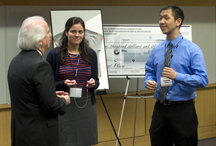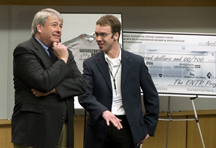Pacemaker testing device, battery life sensor claim top prizes at Purdue Elevator Pitch competition
April 9, 2013
 |
|
Mike
Cassidy, far left, poses as an investor while biomedical engineering
students Elizabeth Mercer and Johnny Zhang make a pitch on their device in the
undergraduate division of the Purdue University Elevator Pitch Competition.
Mercer, of Zionsville, Ind., and Zhang, of Mishawaka, Ind., lead the business
concept called Safe Pace, which is developing an intra-surgical device designed
to determine whether a pacemaker was implanted securely. (Purdue University
photo/John Underwood)
|
WEST LAFAYETTE, Ind. - Students pitching a device for checking pacemaker implants and a sensor for extending battery life in mobile devices took the top prizes at the seventh annual Purdue University Elevator Pitch Competition.
Biomedical engineering students Elizabeth Mercer and Johnny Zhang won the undergraduate division for the concept Safe Pace, which would help surgeons during an operation determine whether a pacemaker implant was mechanically stable.
Electrical engineering doctoral student Wesley Allen claimed the open division with CommSense, a sensor designed to extend the battery life for mobile devices.
Each team claimed $1,000 for their victory during the event Friday (April 5) in the Burton D. Morgan Center for Entrepreneurship in Discovery Park. The Purdue Certificate in Entrepreneurship and Innovation Program organizes the annual competition.
"From innovative biomedical devices and smart-phone technology and applications to sustainable processes and systems, this year's elevator pitch competition provided the opportunity for our entrepreneurially minded students, faculty and staff from disciplines across the Purdue campus to showcase their big ideas," said Jeanette Greener, program manager for the Purdue Certificate in Entrepreneurship and Innovation Program.
"But a few of the pitches stood out above the rest for how the participants communicated the potential value of their idea or business concept and why a venture capitalist might be willing to invest in their idea."
This year's competition included 21 pitchers in the undergraduate division and 10 participants in the category for graduate students, staff and faculty members, certificate program alumni, and Purdue Research Foundation employees. Each participant also received a T-shirt.
Michael Young delivered the most entertaining pitch in the undergraduate student category for Matchbox, a mobile device matchmaking application. Holly Chan had the most entertaining pitch in the open division for The Hero Store, a zero-waste grocer that would sell products in recyclable packaging. They each won $500 for their pitches.
In the undergraduate division, Greg Forney finished second and received $500 for H2gO, a refillable water bottle system, and Peter Chen received $250 for third place for Xylamaize Gel, an innovative pharmaceutical material for time-release drug delivery.
In the open division, Somesh Khandelwal was second, garnering $500 for i-Protect, a durable packaging material for military and building construction applications. Ran An was third, receiving $250 for AniDyn LLC, a biological imaging technique for personalized cancer care treatment.
The annual elevator pitch contest gives each participant two minutes to describe a business venture to judges, highlighting their product or service, their competitive advantage, the market and its size, and plans to make the business profitable.
Event sponsors were Otis Elevator Co., Bingham Greenebaum Doll LLP, Allos Ventures, Indiana Spine Center, Alerding Castor Hewitt LLP, Purdue Federal Credit Union and StepStone Business Partners. Otis Elevator marked its seventh year of support for the competition.
 |
|
Dave
Kitchell, left, poses as an investor in an elevator listening to electrical
engineering doctoral student Wesley Allen make his quick pitch in the open
division during the seventh annual Purdue University Elevator Pitch
Competition. Allen, of Santa Claus, Ind., is leading CommSense, which is
developing a sensor for mobile devices that would extend their battery life.
(Purdue University photo/John Underwood)
|
Posing as venture capitalists and interacting with participants were Dave Kitchell, a Purdue graduate, columnist and teacher who has won 60 state and national journalism awards, and fellow Purdue graduate Mike Cassidy, an instructor in the Certificate in Entrepreneurship and Innovation Program who launched Fortress Strategy Group in 2007 and is a partner in orthopedics industry supplier Arcamed Technology.
The Purdue Certificate in Entrepreneurship and Innovation Program, led by technology leadership and innovation professor Nathalie Duval-Couetil, has enrolled nearly 4,500 undergraduate students since it began in 2005. Similar to a minor, students complete a series of five courses or experiential learning programs to earn the certificate.
Housed in Discovery Park's Burton D. Morgan Center for Entrepreneurship and led by the Office of the Provost, the program is available to Purdue undergraduate students in all majors. Its purpose is to make entrepreneurship an accessible career option by providing students with the skills and knowledge to succeed in business on their own terms.
Writer: Phillip Fiorini, 765-496-3133, pfiorini@purdue.edu
Sources: Jeanette Greener, 765-494-3805, jgreener@purdue.edu
Nathalie Duval-Couetil, 765-494-7068, natduval@purdue.edu

